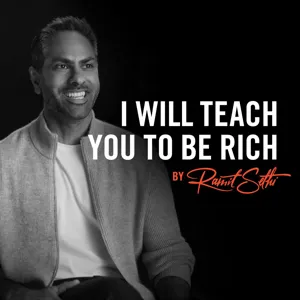Podcast Summary
Expert Assistance and Analytics for Businesses: Ferguson helps customers with projects and orders, while Squarespace offers valuable analytics for businesses to grow and improve.
Ferguson prioritizes their customers' projects and offers expert assistance in bath, kitchen, and lighting products, as well as facilitating orders and delivery coordination. Meanwhile, Squarespace provides valuable analytics for businesses to grow, learn about site visits and sales sources, and improve their website and marketing strategy. Arakawa and Madeline Gins, two artists, have created uncomfortable architecture with the intention of prolonging life through discomfort, featuring undulating floors, angled ceilings, and other unfamiliar designs. However, their firm's financial success is currently at risk due to their heavy investment in the infamous financier Bernard L. Madoff's Ponzi scheme.
A Cautionary Tale of Ponzi Schemes: The Story of Charles Ponzi: Ponzi schemes promise high returns with little risk, but can lead to significant financial losses as they rely on a constant flow of new investors to pay earlier ones
The story of Charles Ponzi serves as a cautionary tale about the dangers of ponzi schemes. Ponzi, an Italian immigrant in the 1920s, started a business based on international reply coupons, which he could buy cheaply in other countries and sell at a profit in the US. The business seemed legitimate at first, but Ponzi promised unrealistic returns, leading to a cycle of paying early investors with funds from new investors. He amassed millions before the scheme was exposed when it was discovered that the number of coupons in circulation was far less than required for the amount of money he had made. Ponzi didn't initially set out to deceive but rather fell into it due to desperation. Ponzi schemes are simple in concept, but as they grow, they can lead to significant financial losses for those involved. The case of Charles Ponzi serves as a reminder to be cautious of promises of high returns with little risk.
Safeguarding Kids Online: Zigazoo vs Ponzi Schemes: Zigazoo is a kid-friendly social media platform with data safety features, while Ponzi schemes are fraudulent investment operations relying on new investors to pay off earlier ones.
While some platforms, like Zigazoo, prioritize data safety and offer a kid-friendly social media experience, others, like Ponzi schemes, rely on deceit and the continuous influx of new investors to pay off earlier backers. Zigazoo is a social network designed specifically for kids. It's Kids Safe COPPA certified, ensuring data safety. Users must obtain parental consent before joining. The platform features moderated videos, no comments, and no messaging, creating a safe space for kids to share their creations with others. On the other hand, a Ponzi scheme is a fraudulent investment operation where returns are paid to early investors from funds contributed by new investors, rather than from profit earned. The scheme requires a constant influx of new investors to pay off earlier ones, creating a pyramid-like structure. Squarespace, on a positive note, offers a user-friendly website design system, Fluid Engine, enabling users to create custom websites and sell merchandise through their online store. The platform's templates are flexible, catering to various categories and use cases. It's essential to be aware of the differences between platforms that genuinely add value and those that rely on deceit. Always do your research and be cautious before investing or joining any platform.
Earliest known Ponzi and Pyramid Schemes: The earliest known Ponzi and Pyramid Schemes, carried out by Sarah Howe and William Franklin Miller respectively, were successful but based on deceit and ultimately collapsed, leaving many investors without their investments.
Ponzi schemes and pyramid schemes are similar in structure, but the main difference lies in the fact that in a Ponzi scheme, you're only an investor and not required to do anything, while in a pyramid scheme, you're expected to recruit new members and sell something. Both schemes can be profitable for early investors, but they are fraudulent and illegal as they rely on new investors' money instead of actual investments. The earliest known Ponzi scheme was carried out by a woman named Sarah Howe in the late 1800s in Boston, who managed to swindle about half a million dollars before being caught. Another notable example is the scheme run by William Franklin Miller around the turn of the century, which also netted around half a million dollars. Despite their historical success, these schemes are based on deceit and ultimately collapse, leaving many investors out of pocket.
Two Notable Ponzi Schemes: Lou Pearlman and Bernie Madoff: Lou Pearlman, creator of Backstreet Boys and NSYNC, ran a Ponzi scheme for over 20 years, while Bernie Madoff, a founder of Nasdaq, targeted exclusive Jewish country club members in a $65 billion fraud
Ponzi schemes have been around for a long time, with Charles Ponzi being one of the earliest known cases. However, two notable cases that stood out are Lou Pearlman and Bernie Madoff. Lou Pearlman, the man behind the Backstreet Boys and NSYNC, ran a Ponzi scheme for over 20 years, funding these bands with illegal money. The scheme in Albania, which defrauded investors out of $2 billion, was another massive Ponzi scheme that crippled the country. Bernie Madoff, a founder of Nasdaq, used affinity fraud to target members of an exclusive Jewish country club in Florida, leading to a scheme worth hundreds of millions of dollars. These cases highlight the devastating impact Ponzi schemes can have on individuals and even entire countries.
Beware of Consistent Returns That Seem Too Good to Be True: Investors and parents should be cautious of seemingly reliable and consistent returns, as they could be a red herring for potential fraud. Thorough research, verification, and regulatory oversight are crucial to mitigate risks.
Consistency in returns, even if seemingly too good to be true, can be a red herring for investors. Bernie Madoff's ability to offer consistent, reasonable returns over long periods attracted many investors, despite mathematically impossible short-term gains being highlighted in financial publications. The SEC's failure to investigate formal complaints against Madoff, in part due to his legitimate business operations, further contributed to his success. It's crucial for investors to be aware of the potential for fraud even when presented with seemingly reliable and consistent returns. Another lesson comes from the emergence of Zigazoo, a social media platform for kids, which emphasizes safety and fun. The platform's human moderation and verification of community members can serve as a model for safe online experiences for children. Investors and parents alike should remain vigilant against potential risks, whether it's unrealistic investment returns or online safety concerns. The importance of thorough research, verification, and regulatory oversight cannot be overstated.
Staying clear of Ponzi schemes: Vigilance and skepticism are key: Be cautious of investments that seem too good to be true, question high-pressure sales tactics, demand transparency, and avoid unsustainable schemes.
Staying clear of Ponzi schemes requires vigilance and skepticism. Madoff's successful $20-$50 billion scheme, which involved using funds from new investors to pay off older ones, highlights the importance of being wary of unrealistic promises and high-pressure pitches. A Ponzi scheme is typically unsustainable in the long run, and the scammer's ultimate goal is often to keep it going until they die. To avoid falling victim, look out for investments that seem too good to be true, be cautious of high-pressure sales tactics, and ask questions about where your money is being invested and who is investing it. Even if you've already invested, it's essential to be aware of fees and to demand transparency. Remember, if it sounds too good to be true, it probably is.
Diversification protects against financial ruin and Ponzi schemes: Investing all money in one asset or sector risks significant losses. Diversification is crucial for building a resilient portfolio and avoiding Ponzi schemes. Contact the SEC if involved in a scheme, but results are uncertain. Ethical questions arise for those close to a scheme, even if unaware. Check out our spoken word album and blog for economic insights.
Diversification is crucial for building a resilient portfolio and avoiding financial ruin, especially when it comes to avoiding Ponzi schemes. Investing all your money into one asset or sector can lead to significant losses, as seen in the case of the 2007 real estate market crash, even for prominent figures like Donald Trump. If you find yourself in a Ponzi scheme, contacting the SEC is an option, although results are uncertain. Additionally, the Madoff case raises ethical questions about the involvement and wealth of those close to the scheme, even if they were unaware. On a lighter note, Josh and I have created a spoken word album about the economy, offering insights and expert interviews, available for purchase on iTunes. Our blog, updated multiple times a day, is another resource for economic information and commentary.
Listeners Share Corrections and New Words: Listeners enriched the podcast with new knowledge and corrections, including the distinction between 'theory' and 'hypothesis', the Sanskrit term 'Yonic', and clarifications about countries using the Imperial system.
The hosts of the Stuff You Should Know podcast, Chuck and Josh, share interesting news items and answer listener questions, some of which involve corrections or clarifications to previous episodes. A listener named Sarah pointed out that the hosts had been using the term "theory" incorrectly, when they meant "hypothesis." Sarah explained that a theory is a well-substantiated explanation, while a hypothesis is an educated guess. Another listener, Stephanie, shared the Sanskrit word "Yonic" or "Yani," which refers to the female genitalia, and the hosts were grateful for the enlightening information. The hosts also corrected a mistake about which countries use the Imperial system, and invited listeners to share any unfamiliar words or corrections.
Solutions for feeling valued: Zigazoo for kids and Discover for adults: Zigazoo offers a safe and moderated space for kids to share creations, while Discover ensures financial protection and 24/7 customer service for adults.
Both Zigazoo and Discover offer unique solutions to make people feel valued in different ways. Zigazoo, a social network for kids, provides a safe and moderated space for children to share their creations with peers, allowing parents to relax knowing their kids are not exposed to social media's potential dangers. Discover, on the other hand, focuses on making everyone feel special with their credit card offerings. They provide 24/7 customer service and $0 fraud liability, ensuring their customers are well taken care of and protected. By catering to the needs and concerns of their respective audiences, both Zigazoo and Discover are changing the game and setting new standards. Parents can trust Zigazoo to provide a safe and engaging platform for their kids, while Discover aims to make everyone feel valued and protected with their financial services.





